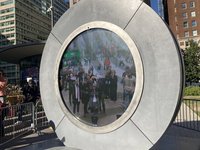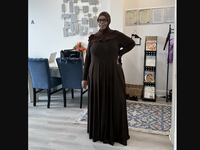Regeneron Pharmaceuticals released data on Monday that shows a single injection of its antibody cocktail can prevent people exposed to the coronavirus from developing COVID-19.
With that data in hand, the drug company will seek expansion of the U.S. Food and Drug Administration emergency use authorization for the antibody cocktail. Right now it is approved to treat mild and moderate COVID-19 disease in those already infected.
- MORE HEALTH
- How to help your kids break out of their pandemic bubble and transition back to being with others
- Anxious about going out into the world? You're not alone, but there's help
- New COVID-19 variant detected in U.S. combines two concerning mutations
"Despite standard precautions to reduce transmission, nearly 10% of unvaccinated individuals living with an infected person developed symptomatic infections if they did not receive REGEN-COV," Myron Cohen, director of the Institute for Global Health and Infectious Diseases at the University of North Carolina at Chapel Hill, said.
"If authorized, convenient subcutaneous administration of REGEN-COV could help control outbreaks in high-risk settings where individuals have not yet been vaccinated, including individual households and group-living settings."
In the Phase 3 trial, Regeneron's antibody cocktail, which combines the monoclonal antibodies casirivimab and imdevimab and is referred to as REGEN-COV, reduced the risk of symptomatic infection by 81%. The two monoclonal antibodies are administered together through an IV.
Monoclonal antibodies are laboratory-made proteins that duplicate the immune system’s ability to fight off viruses. Casirivimab and imdevimab are specifically directed against the spike protein of COVID-19 to block the virus’ attachment and entry into cells.
The trial included 1,505 people who lived in the same household as someone who had tested positive for the coronavirus in the past four days, but had not yet been infected themselves. Participants were either given one dose of the drug or a placebo via an injection.
Overall after 29 days, 11 people in the drug arm of the trial developed symptomatic COVID-19 versus 59 people in the placebo group. According to Regeneron, the drug provided up to 72% protection in the first week and 93% protection in the following weeks.
The study participants who became infected, despite receiving the antibody cocktail, did have milder infections compared with those who fell ill after receiving a placebo. Symptoms resolved within a week instead of lasting three weeks.
Trial data has yet to be peer reviewed or published. The researchers reported adverse events in 20% of the study participants who received the drug and 29% of those given the placebo.
Four of the patients in the placebo group were hospitalized or treated in the Emergency Department. The four deaths that occurred during the trial, two in each arm of the trial, were unrelated to COVID-19 or the drug, the researchers noted.
Regeneron has also released data on a second Phase 3 trial that included 204 people with asymptomatic COVID-19. One injection of the drug reduced the risk of a worsening progression of the disease by 31%. The risk was reduced by 76% three days after the injection.
The antibody cocktail appears to be effective against coronavirus variants as well, the company added.







